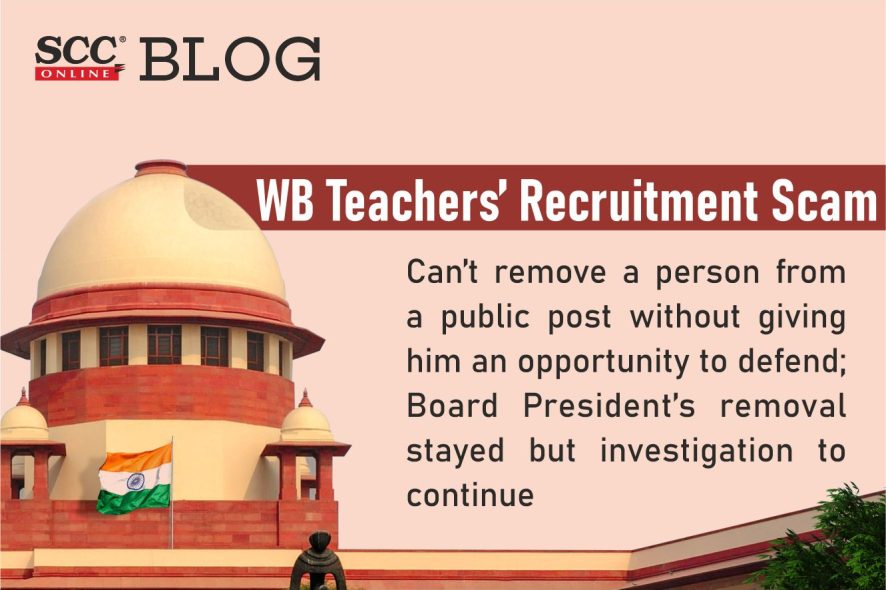Supreme Court: In a special leave petition arising out of a judgment of the division bench of the Calcutta High Court sustaining the orders passed by a single judge, directing investigation by the Central Bureau of Investigation (‘CBI’) into the allegations of irregularities in the recruitment process of assistant primary teachers, and cancellation of appointment of 269 candidates, the division bench of Aniruddha Bose and Vikram Nath, JJ. has directed the CBI to continue their investigation and file a comprehensive report regarding its progress within a period of four weeks, and directed all the 269 individuals to be added as party respondents in the writ petition of 2019. Further, stayed the order directing removal of the petitioner from the post of President of West Bengal Board of Primary Education, but without directing his reinstatement to the said post, and held that the present incumbent to the said post must continue to remain in the said post till outcome of the writ petition.
In this case, the petitioner has questioned the legality of the single judge order directing investigation to the CBI and to set aside the investigation by the CBI, and to revoke all termination orders, as these orders were passed without adhering to the basic requirement of procedural fairness. Further, the petitioner submitted that his removal could not be directed by the Board, as the statutory provisions under Section 9 of the Primary Education Act, 1973 vests such power with the State Government, and he was never given an adequate opportunity of hearing and there was no specific allegation against him in the writ petitions
The Court, while examining the legality of order directing investigation to the CBI, placed reliance on State of W.B. v. Sampat Lal, (1985) 1 SCC 317, wherein it was observed that “the appointment of a Special Officer with a direction to inquire into the commission of an offence can only be on the basis that there has not been a proper investigation.”
The Court opined that under normal circumstances, it would not be appropriate to straightaway direct CBI investigation in a recruitment related controversy, unless, the allegations are so outrageous, and the perpetrators of the alleged offences are so powerful that investigation by the State police would be ineffectual. Further, it was observed that the reasons given by the Single Judge in directing investigation by the CBI at such an early stage of the proceeding may fall short of the standards laid down in the case of Sampat Lal (supra). However, the Court after considering the submissions of the CBI and the fact that the investigation has substantially progressed, did not want to obstruct such an investigation and waited to see if the State Police could carry on the same investigation impartially. Thus, the Court declined the petitioners’ plea to stay that part of the impugned order by which continuance of the investigation by the CBI was ordered and has further directed the CBI to file a comprehensive report as regards the scope and nature of illegalities they have found in the subject recruitment process.
The Court, while dealing with that part of the order by which cancellation of appointment of 269 candidates have been affected, has observed that such cancellation has not been interfered by the division bench, as it has referred to prima facie materials which point to a fraudulent exercise connected with appointments; however, the respondents had not shown any material through which these candidates’ direct involvement in the process of appointment can be shown. Further, the Court took note of the judgment in Divine Retreat Centre v. State of Kerala, (2008) 3 SCC 542, wherein it was held that “no judicial order can ever be passed by any court without providing a reasonable opportunity of being heard to the person likely to be affected by such order and particularly when such order results in drastic consequences of affecting one’s own reputation”.
Thus, the Court stayed that part of the order of the Single Judge by which appointment of 269 candidates were terminated and directed impleadment of petitioners as party respondents in the petition concerned, thereby giving them the opportunity of filing affidavits and opportunity of being heard.
Moreover, the Court held that the order of removal of the President of the Board by the High Court was flawed as it was not fulfilling the requirement of procedural fairness that is necessary to direct removal of a person from a public post. The Court clarified that it is not observing that the High Court cannot at all direct removal of any person from a public post, but such a course shall be taken in a quo warranto proceeding, and if the Court finds that an incumbent has appropriated a public post through deceit, he can be held unfit for the post. But in the present case the Court found him to be responsible for misinformation and for relying on questionable documents before the Court, and in such case, he should have been given an appropriate opportunity to defend his position, or the Court could have directed him not to discharge his duties in the said post.
[Dr. Manik Bhattacharya v. Ramesh Malik, 2022 SCC OnLine SC 1452, decided on 18-10-2022]






